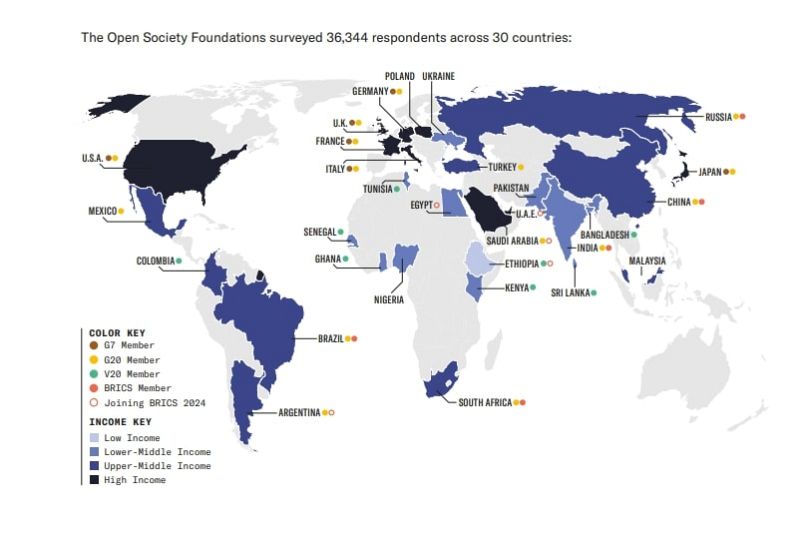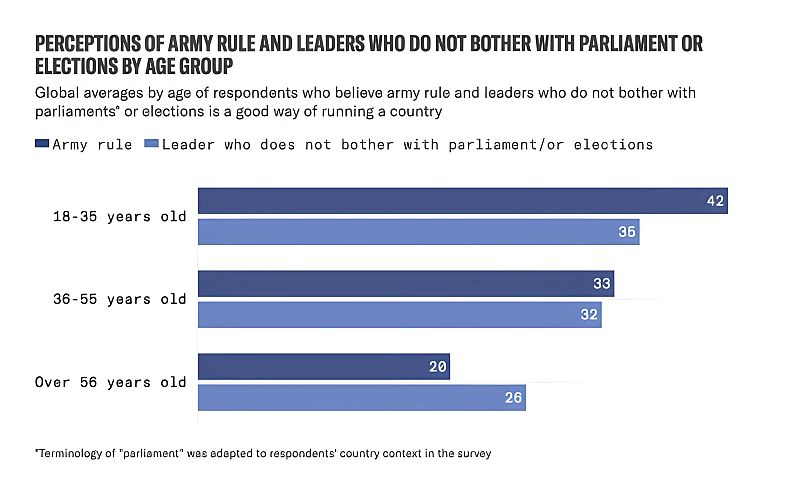According to a survey by Open society foundations, more than a third of 18-35 year olds favour a military regime or an authoritarian leader. How did it come to this?
Do people still believe in democracy? This was the question asked by a recent Open Society Foundations poll, which for the second consecutive year surveyed more than 36,000 people in 30 countries around the world to hear their opinions and feelings about human rights, democracy, and other important issues facing countries around the world.
The "Open Society Barometer: Is Democracy Effective?" survey, one of the largest global polls ever conducted, was conducted between May and July 2023 and the results, published in the run-up to International Democracy Day, are surprising, to say the least.
The concept of democracy is still widely popular in every region of the world: 86% of respondents say they would prefer to live in a democratic state and 62% believe that democracy is the best possible form of government. In Italy, the results were 91% and 69% respectively.
Only 20% of people said that authoritarian states are more capable of satisfying citizens' demands and are more efficient in dealing with major issues at home and in the international arena.
What is surprising, however, is that although trust in democracy is still high across the board, the age group that is most sceptical about its effectiveness is the youngest one, those aged 18 to 35.
If we look at the data disaggregated by age group, the percentage of citizens who consider democracy to be the best possible form of government drops to 55% among the youngest, while it is 61.4% among the 35 to 55-year-olds and 69% among those older than 56.
What is more, 42% of those aged 18-35 said that a military regime is a good way to govern a country, while 35% are in favour of a 'strong' leader who dispenses with elections and parliament. In Italy, the percentages drop to 24 and 32%, respectively.
But how did we get here - and what does it mean for the survival of democracy?
"It is really worrying that the lowest support is in the youngest group, the 18 to 35-year-olds because today we have the largest generation of young people. Half of the world is under 30," says Natalie Samarasinghe, Global director for advocacy at Open Society Foundations.
But, she says, context is important. "It is a combination of factors. We are facing a generation that has experienced a series of shocks: economic crises, COVID-19, climate change, and it is more than proven that authoritarian states have not handled these crises well, but neither have democracies. When you grow up in an era of instability and crisis, you have little trust in politicians. So I think this translates to scepticism about the system as a whole."
In addition to the feeling that politicians have failed to deal with the major crises of recent years, there is also the impression 'that they are worse off' than their parents in terms of socio-economic conditions and, finally, the lack of representation: "How many young people feel that they have a say in democracy when the issues they fight for are never at the top of the agenda?", asks Samarasinghe.
This disaffection for democracy thus stems from a general and continuous mismatch between what citizens demand and what is then actually delivered by the political class. On average, about one-third of the respondents do not trust politicians to work in their interests and address the issues they care about. Primarily poverty, inequality and human rights, climate change and corruption.
The responsibility of other generations
Gianfranco Pasquino, Professor Emeritus of Political Science, agrees with Samarasinghe not only on the socio-economic difficulties that have marked the last generations but also on the responsibility of the political class. "Parties have become inadequate structures. Parties teach democracy, practise it and show how to practise it. A great American political scientist wrote a book in the early 1940s saying that parties are born with democracy and democracy is born with parties. Consequently, democracy dies if parties die and instead thrives if parties recover. But I do not see this effort on the part of politicians," Pasquino explains.
However, the professor also attributes some of the responsibility for young people's disaffection with the democratic system to the older generations, who are progressively more pro-democracy. Among the over 56 interviewed, the most authoritarian regimes are not particularly popular: only 20% are open to a military state, and 26% to a strong leader.
A considerable difference with younger people, but one that is easily explained according to Pasquino: "Quite simply, many of them have lived part of their lives under an authoritarian regime and know that they would never want to go back. Instead, they have had positive or at least better experiences with democracy than young people. But it would have been better if they had passed on this information, feelings and emotions to their children. Perhaps they did not do it enough."
Is democracy at risk of extinction?
So what does this data tell us about the health and future of democracy? Is there really a risk that the democratic system will gradually fade away? Neither expert sees this as even remotely possible.
"Democracies continue to appear, and the established ones have never fallen. It is actually wrong to say that there is a crisis of democracy, there are problems in the functioning within some democracies, for example,Hungary, for example, Poland, but democracy is not in crisis," says Professor Pasquino.
Samarasinghe goes even deeper: "The trend has always been and will be towards more freedom. And I think this survey also shows that there is this desire. Only that people now see a discrepancy between this desire and their lives. But I don't think their solution is 'OK, we will turn to an authoritarian system'. It may be a short-term solution, but not a long-term one. The values that people personally hold dear, including human rights, are so deeply rooted even in countries that currently have more authoritarian governments, that they cannot possibly fade away."
Rather, the concern is another: what can happen during this period of misalignment. "I think political leaders, national and international, need to keep in mind what the consequences of inaction are. It is not just a matter of saying: 'OK, we don't want to give up coal production now because we have this industry in the lobby and we might lose the next election.' The whole system is at stake here."













